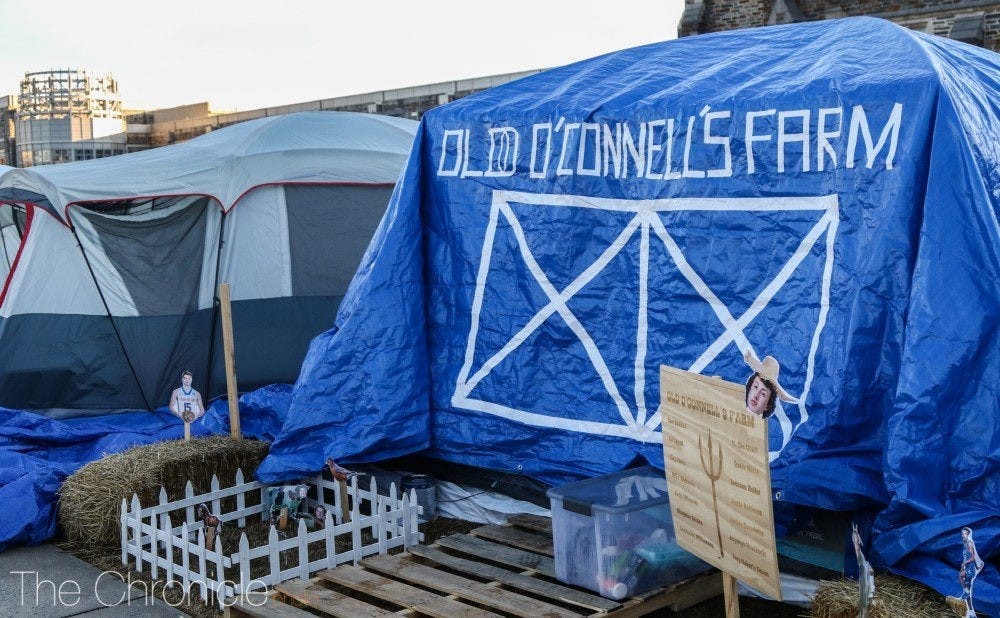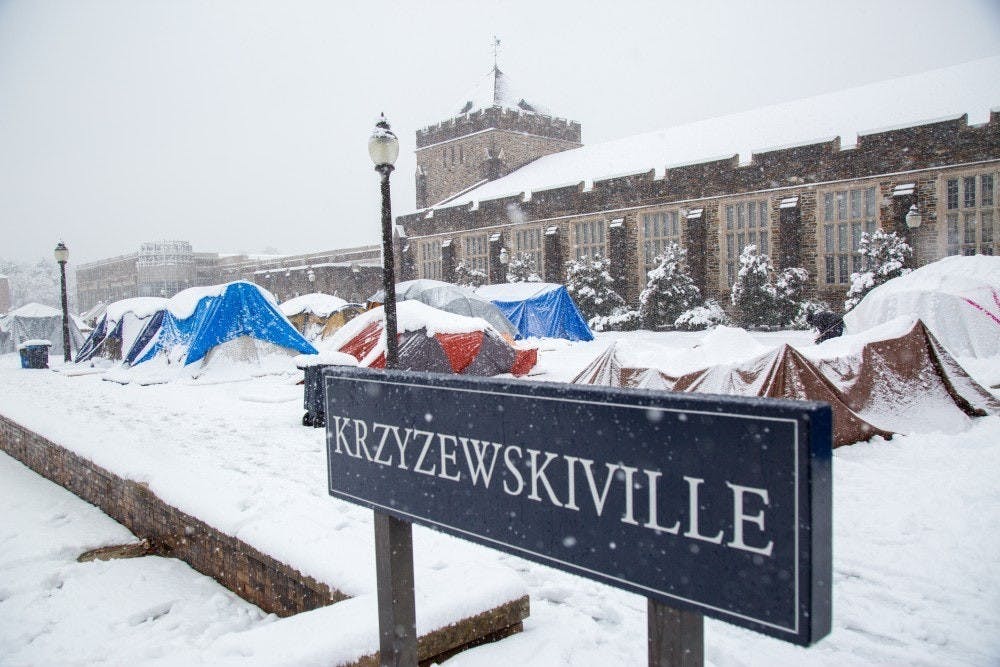Americans collectively spend roughly 37 billion hours waiting in line each year. These queues range from grocery store checkout lines to traffic jams, and Duke’s campus is no different. Lines are everywhere on Duke’s campus, from Sazón to Vondy to the crowd getting on the C1 at 9:45 each morning.
Duke’s campus also happens to be home to an extremely famous line, with roughly 1,200 undergraduate students camping out each spring for entry into the Duke-UNC men’s basketball game. At the start of each spring semester, students return to campus and almost immediately begin camping out, or “tenting,” as part of the massive tent city known as Krzyzewskiville, a far cry from its humble origins.
Tenting began as an informal process in 1986, when a few students decided they wanted the best seats in the house for the Carolina game. Instead of getting in line the morning of the game, they pitched tents on the lawn in front of Cameron Indoor Stadium to secure their spots a few days before the big game, accidentally creating one of the most recognized traditions in college sports.
Tenting today is much different and more regulated than its grassroots origins. Each year, a group of student line monitors oversees K-Ville, calling tent checks and administering trivia tests to determine which groups of 12 students will earn the 100 coveted tenting spots. This year’s official tenting rules and regulations are contained in a 43-page document, detailing everything from procedures for missed tent checks to policies allowing for grace in the event of extreme weather.
Senior Steve Hassey, one of this year’s head line monitors, doesn’t see K-Ville as merely a line to get into the games or a set of rules to be navigated—he views it as a community. During our interview, Hassey paused to check weather.com, the official site used by line monitors to determine the temperature, to ensure that it had not dipped below the minimum cutoff for grace.
“When you really think about it, it doesn’t make a lot of sense to sleep out in the cold for two months to go to a two-hour basketball game,” Hassey said. “I think [more than] half of it is the community aspect... it’s this incredible tradition you’ve heard so much about, so that when you come to Duke, you want to take part in it.”
Hassey has also noticed that although it is difficult to be uninterested in one of the country’s best college basketball programs, things other than the sport itself draw students to K-Ville.
“[Some of my friends who tent] objectively are not basketball fans,” he said. “They’re in K-Ville because they genuinely want to take part in this community and Duke tradition.”
Each year, students add to the lore of K-Ville and make it their own. Students construct patios for their tents, play pickup basketball and create traditions during their time camping out—this year, one tenting group led a sing-along of “Take Me Home, Country Roads” by John Denver after the first tent check of the night. An Instagram account, Overheard K-Ville, was created to anonymously document memorable quotes from tenters.

A precarious position
Waiting in line is already a subconsciously stressful phenomenon, and this stress can be magnified by uncertainty regarding whether or not waiting in line will actually result in obtaining what individuals are waiting for. This could be part of the reason a drunken mob of students in the Carolina Walk-Up Line last year was running around K-Ville last year, throwing full beer cans at each other, eating signs, and trampling line monitors.
This year, to avoid a repeat of the fiasco, the line monitors killed Walk-Up Line and replaced it with flex tenting—a system designed to bring more order to the uncertainty of not having a guaranteed spot at the game. Students in all 30 flex tents in K-Ville this year ended up getting into the game.
“A large part of the problem last year was the amount of uncertainty,” Hassey said.
He estimated that between 900 and 1,000 students joined the Walk-Up Line last year, making it difficult for line monitors to control the crowd and creating confusion for the students waiting in line for just a few open spots inside Cameron.
Even after the Walk-Up Line fiasco, a large degree of uncertainty once again led to disappointment for many students this fall. Countdown to Craziness, the annual men’s basketball season opening scrimmage and showcase, is the sole basketball event that requires students to obtain physical tickets when it occurs during parents’ weekend in the fall. Tickets are always in high demand, but this year was an exceptional case, with tickets going on sale at 6 a.m. and selling out by 9 a.m.
Sophomore Grace Novak left her room in Kilgo Quad around 5 a.m. the morning of the ticket sales, figuring that her room’s close proximity to the athletics ticket office would allow her to secure a decent spot in line. Instead, she arrived and found groups of friends clumped together in an attempt at a single-file line. Soon after she arrived, students in line were instructed to snake the line closer to the ticket office, creating an opportunity for students to cut each other and causing widespread frustration.
“The setup they had created the easiest possible situation for people to cut in line,” she said.
Students in line repeatedly tried to alert line monitors stationed around K-Ville to this problem, but the unregulated nature of the line and uncertainty about the availability of tickets made it difficult to punish those who were cutting. Many students left K-Ville empty-handed and upset with the lack of regulation.
An impromptu walk-up line
The lines—and the chaos—aren’t exclusive to K-Ville. Another part of campus may have its own line monitors soon, after the line for last year’s E-ball tickets took over the engineering quad.
Each year, Engineering Student Government hosts its prom-style “E-Ball” celebration for Pratt students, and in recent years, tickets have become increasingly difficult to obtain. Senior Tracy Lu, last year’s ESG president, and junior Katherine Tighe, E-Ball chair, attribute the long lines to the current ticket distribution system. In 2017, tickets were sold out on the first day they were available for all classes to purchase, so last year, ESG chose to divide the tickets so that a certain number could only be sold each day.
This quota system led to chaos on the first day tickets were available, culminating with the manager of Twinnie’s—the café in the engineering quad where ticket sales were occurring—asking ESG members to move the line outside because it was disruptive to business. According to Tighe, the move outside led students to form a K-Ville style ‘walk-up line’ of their own before ticket sales began the next day.
“People just became like line monitors and had a spreadsheet or a list where everyone wrote their names down,” she described. “They would do their own line checks and then right before tickets were being sold, they barricaded the line so no one could cut in.”
ESG members were pleasantly surprised at how smoothly the self-regulated system ran compared to the chaos of the day before, but while Tighe admits that the current ticket system may need to be adjusted, you won’t see any blue jackets in the engineering quad any time soon.
“I definitely don't think any of us want to be line monitors,” she said.
The madness doesn’t stop there—Duke students can camp out for things even as alumni. The Duke Chapel website has a page devoted to procedures for camping out to get the first chance at securing dates for a Chapel wedding.
The Chapel’s website notes that “as every student knows, there is a robust camp-out culture at Duke,” but the Chapel does not endorse or encourage camping out for wedding dates. Nevertheless, a few brave couples choose to camp out each month to secure their preferred date a year in advance, pitching their tents under the magnolia tree to the right of the chapel until the Chapel business office opens on the first weekday of the month.
An elitist reputation
Why are Duke students so uniquely obsessed with waiting in lines? Waiting in line can be viewed as a way of distinguishing oneself as part of an elite or niche group, according to David Gibson, a sociologist at the University of Notre Dame who studies social networks and social interaction. At a university historically famous for its elitism, maybe the ubiquity of lines shouldn’t come as a surprise.
Duke is known as an “Ivy-plus” institution, part of the top tier of the nation’s most elite institutions, with an acceptance rate of 8.3 percent for the Class of 2022. Duke’s student body historically draws heavily from the top of the socioeconomic ladder, with 19 percent of students coming from the top 1 percent in median family income, the third-highest rate among elite colleges.
Duke doesn’t shy away from this reputation, either. The university’s “Culture of Champions” is widely touted on its admissions website, highlighting Duke’s “tradition of winning” that shapes the lives of its students.
At a university with a highly selective admissions process, rigorous academics, storied athletics and an exclusive social culture, it shouldn’t come as a surprise that Duke students will go to almost any length to distinguish themselves.
Take it straight from one of them—in Hassey’s own words, tenting is “really f***ing weird.” But amid widespread generational burnout and high levels of anxiety and depression, lines can create a small oasis of stability in the frenzied existence of Duke students—a space where, for a moment, we know what to expect.
Whether we’re waiting to see Zion Williamson dunk or just waiting to get a cup of coffee before class, we all want the same thing—to have our place recognized, to have a small piece of order to ourselves in the face of uncertainty.
Get The Chronicle straight to your inbox
Signup for our weekly newsletter. Cancel at any time.

